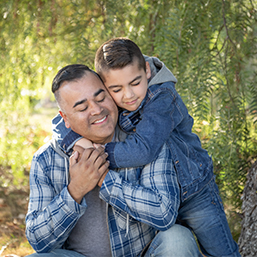
You’re busy making dinner, chatting away with your friend on the phone and your child overhears some of the conversation. Your child might ask, “What were you talking about? Why did you say that? What does that mean?” You pause, and then consider, “How do I explain what they heard? How much do they need to know?”
In our evolving parenting roles, the distinction between being a parent and being a friend to your child is an important one. We want to have close and affectionate bonds with our children, built on trust and respect, but we also need to be aware of how much we decide to share or disclose regarding our personal adult lives. Honesty and transparency are important, but we also need to be aware of how to provide information in a way that is age-appropriate and sensitive to their emotional development. Here are some tips to consider when deciding how much to share with your child, and what boundaries to maintain when talking to them about adult things:
Age appropriateness. When deciding what information to share, you should always consider your child’s age and developmental stage. Some adult topics may be tricky for younger children to understand, while older children may be better able to process certain information. A general rule of thumb is the younger the child, the simpler the explanation. Use concrete terms that avoid obscure analogies to help reduce confusion and filter details that aren’t necessary. Try asking them to repeat what you explained to get a better sense of their understanding, and make sure you let your child know that they can come to you to ask more questions later if they need more clarification. Giving your child too much information, in words that are too advanced for them, will do nothing except create more confusion and misinformation.
Focus on the teachable moments. Maybe they overhear an argument or an unkind comment and think, “Why did they say that? That wasn’t very nice.” As our kids grow and mature, they become better able to understand increasingly complex social interactions. Instead of diving into the details of the interaction with your friend, use this opportunity to teach a bigger life lesson about how we treat others, empathy, and creating healthy boundaries in relationships. Use age-appropriate examples, talk about people’s feelings and ask them how they might handle a similar situation with a peer. These types of interactions are a great way to model healthy communication, problem-solving skills, and show them how adults handle difficult social situations and work through relationships with honesty and respect.
Boundaries. There will be certain topics that may not be appropriate or necessary to talk about with your child. You don’t want to get into too much detail about topics that are not age-appropriate or go against your family values. It’s okay in these instances to be honest with your child. Let them know this is an adult topic that they are not ready to know about yet, or that you don’t feel quite comfortable talking about it with them. That being said, you can still show respect for these boundaries and be open to discussing any of their questions. It can also be okay to revisit difficult conversation topics later, after you have had time to think about how to handle it. Check in with a friend about how they talked to their child, talk to your partner about what you want your child to know, or consult with a professional if you aren’t sure what to say or how to handle it.
Friends, partners, and confidantes. As we work hard to maintain relationships with our children, build appropriate boundaries, and teach them about the complexities of social relationships, it is important to remember that our children should not be responsible for holding our emotions, hearing our inner thoughts, or providing advice. Maintaining appropriate boundaries with our children gives them the safety and security of knowing that we are their fearless leader, and that they can depend on us. Spending time maintaining friendships with childhood friends, other parents, coworkers, your partner, or finding a therapist you trust and connect with, will provide you an outlet for adult-centered conversations, and helps maintain those boundaries and relationships with your child.
As parents, we wear many hats when it comes to taking care of our children, but we should always show discretion when it comes to sharing personal or complex information about our adult lives. By approaching these conversations with honesty, discretion, and sensitivity, you can help your child understand our adult worlds in a way that is age-appropriate and beneficial to their growth and understanding.
Ashlee and Lisa are child psychologists who created KidsConnect Psychology as a place for children and families to access tools, supports, and therapy. Check out our website for digital downloads, parenting tool kits, information about our parent counselling, school consultations, daycare consultations, and more! kidsconnectpsychology.com. Follow us on Facebook and Instagram at KidsConnect Psychology.
See our related articles:
Calgary’s Child Magazine © 2024 Calgary’s Child